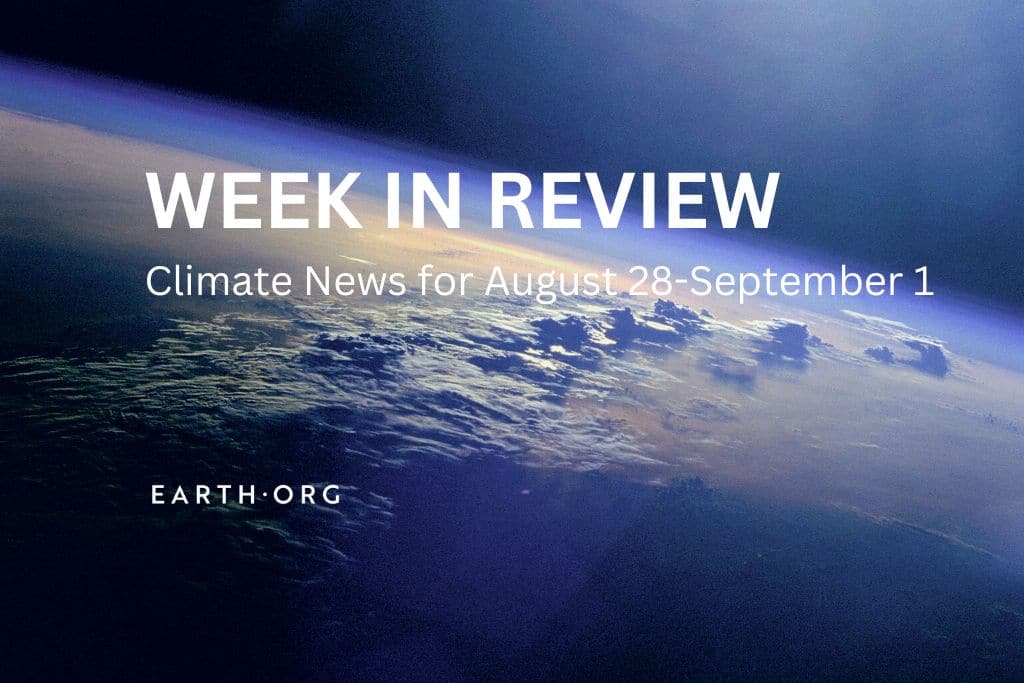This weekly round-up brings you key climate news from the past seven days, including a new study on the consequences of air pollution on life expectancy, a bleak future for Emperor penguins, and the role of climate change in the latest hurricane to hit Southern US.
—
1. Air Pollution in South Asia Cuts Life Expectancy By 5 Years on Average: Report
People living in four South Asian nations – Bangladesh, India, Nepal, and Pakistan – are expected to lose about five years of their lives on average because of air pollution, new data suggests.
According to the annual Air Quality Life Index published Tuesday by the University of Chicago’s Energy Policy Institute (EPIC), particulate pollution in South Asia has increased by 9.7% from 2013 to 2021, contributing to an additional 6 months’ reduction in life expectancy for the region’s residents.
People living in Sub-Saharan Africa and South Asia regions are significantly more likely to die from outdoor air pollution, with death rates approximately 100 times greater than in Europe and North America.
Read more here.
2. Over 90% of Emperor Penguins Will Be Quasi-Extinct By 2100 If Current Antarctica Sea Ice Loss Rates Persist: Study
Climate change-triggered melting of sea ice in Antarctica is taking a heavy toll on emperor penguins and could wipe out entire populations by as early as 2100, new research suggests.
Classified as one of Antarctica’s most vulnerable species, emperor penguins require sea ice attached to solid land between April and January to breed. This makes them extremely vulnerable to rapid sea ice loss in the region, which reached record levels in the spring season of 2022.
Commenting on the findings, lead author Peter Fretwell said researchers have “never seen emperor penguins fail to breed at this scale for a single season.”
Read more here.
3. Biden Says Climate Change Is Undeniable After Cat. 3 Hurricane Idalia Lashes Florida
Hurricane Idalia made landfall near Keaton Beach in Florida’s Big Bend region on Wednesday morning with maximum sustained winds of about 125 mph (201 kph) and torrential rains, before weakening and moving toward southeastern Georgia, where floodwaters trapped dozens of residents in their homes.
After leaving western Cuba on Monday as a tropical storm, Idalia gained strength rapidly in the Gulf of Mexico as it made its way up to Florida, feeding on the Gulf’s warm, open waters and humid air, two of the main ingredients for hurricanes to develop and intensify. Indeed, as the storms travel across warm oceans, they pull in more water vapour and heat, resulting in stronger wind, heavier rainfall, and more flooding when the storms make landfall.
Though authorities are still assessing the full extent of damage in the hardest-hit areas, it appears the powerful hurricane was far less destructive than initially predicted.
Read more here.
4. Hundreds of Firefighters Battle Deadly Wildfire in Greece’s Evros, Europe’s Largest Single Fire in History
More than 600 firefighters from Greece and several other European countries are working incessantly to contain a wildfire that has been raging near the northeastern Greek region of Evros for ten days and that has so far killed at least 20 people.
Charged by strong winds and high temperatures that soared above 40C, the wildfire has spread uncontrollably from the city of Alexandroupolis across the entire Greek region. Deputy governor Dimistris Petrovich told national broadcaster ERT on Sunday that the fire, which at that point had been raging for nine days, was unlikely to be brought under control.
Thousands of people have fled their homes across Greece this summer due to wildfires. In July, some 19,000 tourists were evacuated from the island of Rhodes as dozens of ferocious wildfires spread uncontrollably on three fronts across the Aegean island over the hottest weekend the country had seen in 50 years.
Read more here.
5. Indian Businesses Urge G20 Nations to Adopt Credible Decarbonisation Targets Ahead of Meeting in New Delhi
More than a dozen businesses have urged G20 nations to adopt credible and ambitious climate targets for rapid decarbonisation of the private sector aligned with the Paris Agreement.
In an open letter led by the Climate Group and We Mean Business Coalition, steelmaker JSW Group, manufacturer Godrej and Boyce, clean energy producer ReNew, IKEA India, and 10 other major Indian and global companies emphasised the necessity for long-term policy planning to enable companies to commit to bold climate action strategies.
The letter includes several key policy asks for the world’s 20 largest economies, which collectively account for more than 83% of global greenhouse gas emissions and 75% of international trade. The signatories urged governments to phase out all unabated fossil fuels in line with the 1.5C target, achieve power grid decarbonisation by 2035 in advanced economies and 2040 in developing nations, and develop bold action plans to decarbonise highly polluting sectors such as steel and concrete.
Read more here.

















